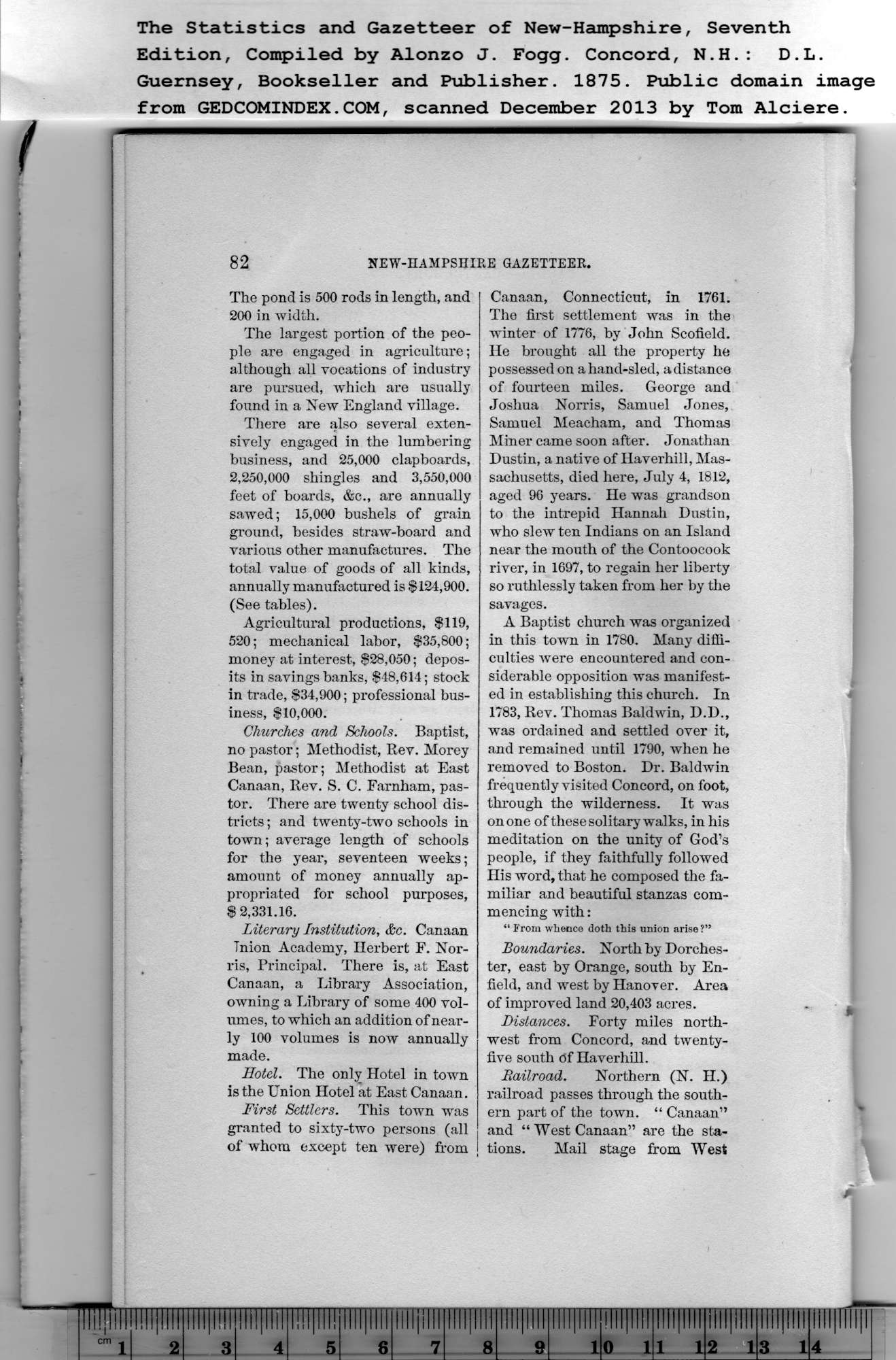|
The pond is 500 rods in length, and
200 in width.
The largest portion of the peo-
ple are engaged in agriculture;
although all vocations of industry
are pursued, which are usually
found in a New England village.
There are also several exten-
sively engaged in the lumbering
business, and 25,000 clapboards,
2,250,000 shingles and 3,550,000
feet of boards, &c., are annually
sawed; 15,000 bushels of grain
ground, besides straw-board and
various other manufactures. The
total value of goods of all kinds,
annually manufactured is $124,900.
(See tables).
Agricultural productions, $119,
520; mechanical labor, $35,800;
money at interest, $28,050; depos-
its in savings banks, $48,614; stock
in trade, $34,900; professional bus-
iness, $10,000.
Churches and Schools. Baptist,
no pastor; Methodist, Rev. Morey
Bean, pastor; Methodist at East
Canaan, Rev. S. C. Farnham, pas-
tor. There are twenty school dis-
tricts ; and twenty-two schools in
town; average length of schools
for the year, seventeen weeks;
amount of money annually ap-
propriated for school purposes,
$2,331.16.
Literary Institution, &c. Canaan
Tnion Academy, Herbert F. Nor-
ris, Principal. There is, at East
Canaan, a Library Association,
owning a Library of some 400 vol-
umes, to which an addition of near-
ly 100 volumes is now annually
made.
Hotel. The only Hotel in town
is the Union Hotel at East Canaan.
First Settlers. This town was
granted to sixty-two persons (all
of whom except ten were) from |
Canaan, Connecticut, in 1761.
The first settlement was in the
winter of 1776, by John Scofield.
He brought all the property he
possessed on a hand-sled, a distance
of foui’teen miles. George and
Joshua Norris, Samuel Jones,
Samuel Meacham, and Thomas
Miner came soon after. Jonathan
Dustin, a native of Haverhill, Mas-
sachusetts, died here, July 4, 1812,
aged 96 years. He was grandson
to the intrepid Hannah Dustin,
who slew ten Indians on an Island
near the mouth of the Contoocook
river, in 1697, to regain her liberty
so ruthlessly taken from her by the
savages.
A Baptist church was organized
in this town in 1780. Many diffi-
culties were encountered and con-
siderable opposition was manifest-
ed in establishing this church. In
1783, Rev. Thomas Baldwin, D.D.,
was ordained and settled over it,
and remained until 1790, when he
removed to Boston. Dr. Baldwin
frequently visited Concord, on foot,
through the wilderness. It was
on one of these solitary walks, in his
meditation on the unity of God’s
people, if they faithfully followed
His word, that he composed the fa-
miliar and beautiful stanzas com-
mencing with:
“ From whence doth this union arise ?”
Boundaries. North by Dorches-
ter, east by Orange, south by En-
field, and west by Hanover. Area
of improved land 20,403 acres.
Distances. Forty miles north-
west from Concord, and twenty-
five south of Haverhill.
Railroad. Northern (N. H.)
railroad passes through the south-
ern part of the town. “ Canaan”
and “ West Canaan” are the sta-
tions. Mail stage from West |
